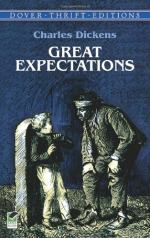I walked away at a good pace, thinking it was easier to go than I had supposed it would be, and reflecting that it would never have done to have had an old shoe thrown after the coach, in sight of all the High-street. I whistled and made nothing of going. But the village was very peaceful and quiet, and the light mists were solemnly rising, as if to show me the world, and I had been so innocent and little there, and all beyond was so unknown and great, that in a moment with a strong heave and sob I broke into tears. It was by the finger-post at the end of the village, and I laid my hand upon it, and said, “Good-bye O my dear, dear friend!”
Heaven knows we need never be ashamed of our tears, for they are rain upon the blinding dust of earth, overlying our hard hearts. I was better after I had cried, than before — more sorry, more aware of my own ingratitude, more gentle. If I had cried before, I should have had Joe with me then.
So subdued I was by those tears, and by their breaking out again in the course of the quiet walk, that when I was on the coach, and it was clear of the town, I deliberated with an aching heart whether I would not get down when we changed horses and walk back, and have another evening at home, and a better parting. We changed, and I had not made up my mind, and still reflected for my comfort that it would be quite practicable to get down and walk back, when we changed again. And while I was occupied with these deliberations, I would fancy an exact resemblance to Joe in some man coming along the road towards us, and my heart would beat high. — As if he could possibly be there!
We changed again, and yet again, and it was now too late and too far to go back, and I went on. And the mists had all solemnly risen now, and the world lay spread before me.
This is the end of the first stage of Pip’s expectations.
Chapter 20
The journey from our town to the metropolis, was a journey of about five hours. It was a little past mid-day when the fourhorse stage-coach by which I was a passenger, got into the ravel of traffic frayed out about the Cross Keys, Wood-street, Cheapside, London.
We Britons had at that time particularly settled that it was treasonable to doubt our having and our being the best of everything: otherwise, while I was scared by the immensity of London, I think I might have had some faint doubts whether it was not rather ugly, crooked, narrow, and dirty.




